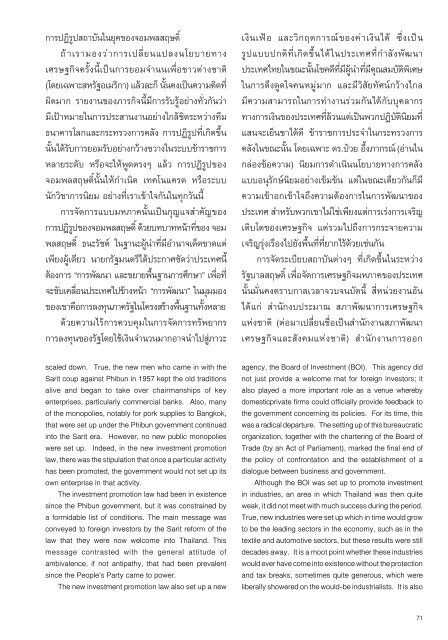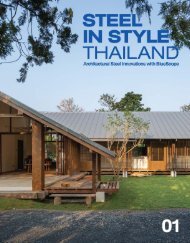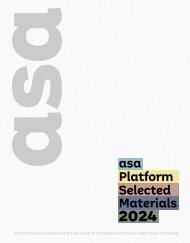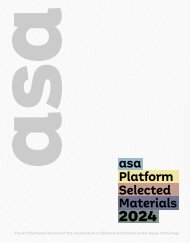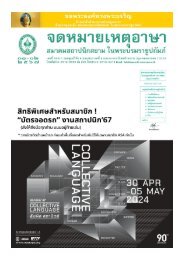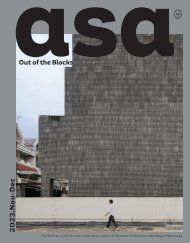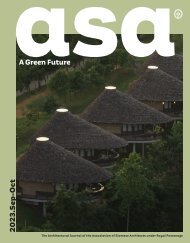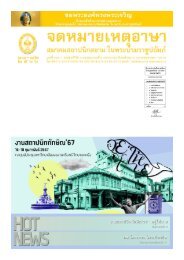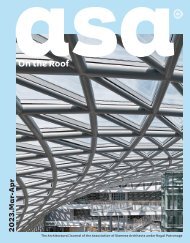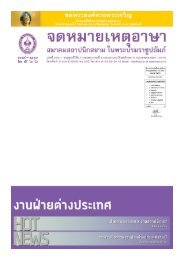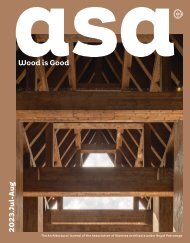บ้านเรือนถิ่นไทยในช่วงเจ็ดทศวรรษ 2489-2559
Create successful ePaper yourself
Turn your PDF publications into a flip-book with our unique Google optimized e-Paper software.
การปฏิรูปสถาบันในยุคของจอมพลสฤษดิ์<br />
ถ้าเรามองว่าการเปลี่ยนแปลงนโยบายทาง<br />
เศรษฐกิจครั้งนี้เป็นการยอมจำนนเพื่อชาวต่างชาติ<br />
(โดยเฉพาะสหรัฐอเมริกา) แล้วละก็ นั้นคงเป็นความคิดที่<br />
ผิดมาก รายงานของภารกิจนี้มีการรับรู้อย่างทั่วกันว่า<br />
มีเป้าหมายในการประสานงานอย่างใกล้ชิดระหว่างทีม<br />
ธนาคารโลกและกระทรวงการคลัง การปฏิรูปที่เกิดขึ้น<br />
นั้นได้รับการยอมรับอย่างกว้างขวางในระบบข้าราชการ<br />
หลายระดับ หรือจะให้พูดตรงๆ แล้ว การปฏิรูปของ<br />
จอมพลสฤษดิ์นั้นให้กำเนิด เทคโนแครต หรือระบบ<br />
นักวิชาการนิยม อย่างที่เราเข้าใจกันในทุกวันนี้<br />
การจัดการแบบมหภาคนั้นเป็นกุญแจสำคัญของ<br />
การปฎิรูปของจอมพลสฤษดิ์ ด้วยบทบาทหน้าที่ของ จอม<br />
พลสฤษดิ์ ธนะรัชต์ ในฐานะผู้นำที่มีอำนาจเด็ดขาดแต่<br />
เพียงผู้เดียว นายกรัฐมนตรีได้ประกาศชัดว่าประเทศนี้<br />
ต้องการ “การพัฒนา และขยายพื้นฐานการศึกษา” เพื่อที่<br />
จะขับเคลื่อนประเทศไปข้างหน้า “การพัฒนา” ในมุมมอง<br />
ของเขาคือการลงทุนภาครัฐในโครงสร้างพื้นฐานทั้งหลาย<br />
ด้วยความไร้การควบคุมในการจัดการทรัพยากร<br />
การลงทุนของรัฐโดยใช้เงินจำนวนมากอาจนำไปสู่ภาวะ<br />
scaled down. True, the new men who came in with the<br />
Sarit coup against Phibun in 1957 kept the old traditions<br />
alive and began to take over chairmanships of key<br />
enterprises, particularly commercial banks. Also, many<br />
of the monopolies, notably for pork supplies to Bangkok,<br />
that were set up under the Phibun government continued<br />
into the Sarit era. However, no new public monopolies<br />
were set up. Indeed, in the new investment promotion<br />
law, there was the stipulation that once a particular activity<br />
has been promoted, the government would not set up its<br />
own enterprise in that activity.<br />
The investment promotion law had been in existence<br />
since the Phibun government, but it was constrained by<br />
a formidable list of conditions. The main message was<br />
conveyed to foreign investors by the Sarit reform of the<br />
law that they were now welcome into Thailand. This<br />
message contrasted with the general attitude of<br />
ambivalence, if not antipathy, that had been prevalent<br />
since the People’s Party came to power.<br />
The new investment promotion law also set up a new<br />
เงินเฟ้อ และวิกฤตการณ์ของค่าเงินได้ ซึ่งเป็น<br />
รูปแบบปกติที่เกิดขึ้นได้ในประเทศที่กำลังพัฒนา<br />
ประเทศไทยในขณะนั้นโชคดีที่มีผู้น ำที่มีคุณสมบัติพิเศษ<br />
ในการดึงดูดใจคนหมู่มาก และมีวิสัยทัศน์กว้างไกล<br />
มีความสามารถในการทำงานร่วมกันได้กับบุคลากร<br />
ทางการเงินของประเทศที่ล้วนแต่เป็นพวกปฏิบัตินิยมที่<br />
แสนจะเย็นชาได้ดี ข้าราชการประจำในกระทรวงการ<br />
คลังในขณะนั้น โดยเฉพาะ ดร.ป๋วย อึ้งภากรณ์ (อ่านใน<br />
กล่องข้อความ) นิยมการดำเนินนโยบายทางการคลัง<br />
แบบอนุรักษ์นิยมอย่างเข้มข้น แต่ในขณะเดียวกันก็มี<br />
ความเข้าอกเข้าใจถึงความต้องการในการพัฒนาของ<br />
ประเทศ สำหรับพวกเขาไม่ใช่เพียงแต่การเร่งการเจริญ<br />
เติบโตของเศรษฐกิจ แต่รวมไปถึงการกระจายความ<br />
เจริญรุ่งเรืองไปยังพื้นที่ที่ยากไร้ด้วยเช่นกัน<br />
การจัดระเบียบสถาบันต่างๆ ที่เกิดขึ้นในระหว่าง<br />
รัฐบาลสฤษดิ์ เพื่อจัดการเศรษฐกิจมหภาคของประเทศ<br />
นั้นมั่นคงตราบกาลเวลาจวบจนบัดนี ้ สี่หน่วยงานอัน<br />
ได้แก่ สำนักงบประมาณ สภาพัฒนาการเศรษฐกิจ<br />
แห่งชาติ (ต่อมาเปลี่ยนชื่อเป็นสำนักงานสภาพัฒนา<br />
เศรษฐกิจและสังคมแห่งชาติ) สำนักงานการออก<br />
agency, the Board of Investment (BOI). This agency did<br />
not just provide a welcome mat for foreign investors; it<br />
also played a more important role as a venue whereby<br />
domesticprivate firms could officially provide feedback to<br />
the government concerning its policies. For its time, this<br />
was a radical departure. The setting up of this bureaucratic<br />
organization, together with the chartering of the Board of<br />
Trade (by an Act of Parliament), marked the final end of<br />
the policy of confrontation and the establishment of a<br />
dialogue between business and government.<br />
Although the BOI was set up to promote investment<br />
in industries, an area in which Thailand was then quite<br />
weak, it did not meet with much success during the period.<br />
True, new industries were set up which in time would grow<br />
to be the leading sectors in the economy, such as in the<br />
textile and automotive sectors, but these results were still<br />
decades away. It is a moot point whether these industries<br />
would ever have come into existence without the protection<br />
and tax breaks, sometimes quite generous, which were<br />
liberally showered on the would-be industrialists. It is also<br />
71


